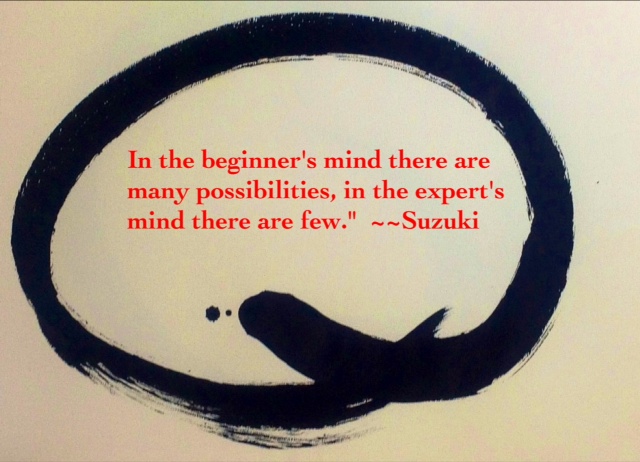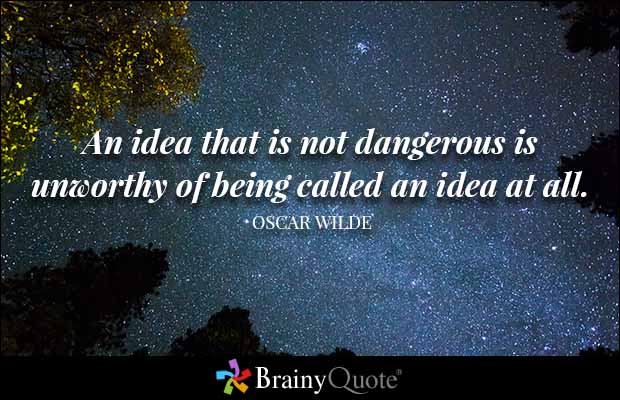Innovation Needs Dumb Ideas
 Kim BellardOver the years I've listened to many new-to-health-care entrepreneurs pitch their great new idea. They're so excited: health care is so inefficient! People are so frustrated by the system! It will be so easy to improve it!
Kim BellardOver the years I've listened to many new-to-health-care entrepreneurs pitch their great new idea. They're so excited: health care is so inefficient! People are so frustrated by the system! It will be so easy to improve it!
I usually end up thinking, "Oh, you poor people. You really don't know much about health care, do you?" They don't fully grasp the strange way it is bought and sold, the convoluted financing, or the layers of regulation. So I wish them well and wait to hear about their eventual failure.
But now I'm thinking, maybe it is experts like me who are part of health care's problem.
In Harvard Business Review, Ayse Birsel suggests that companies need to do more "reverse thinking," deliberately thinking up wrong ideas. As she says:
Wrong thinking is when you intentionally think of the worst idea possible — the exact opposite of the accepted or logical solution, ideas that can get you laughed at or even fired — and work back from those to find new ways of solving old problems.
"Wrong" ideas force us to think differently, and to identify exactly what about them is actually wrong. Doing so can open up new ideas or new avenues to investigate. One of her examples of this is biochemist Fred Sanger, who was trying to sequence DNA back in the 1970's. He went at this by trying to do the opposite, building DNA instead of breaking it down. His resulting insights garnered him his second Nobel Prize.
Ms. Birsel has several suggestions for how companies can spur such wrong thinking, but the most powerful one may be "Be the Beginner." She cites the famous Zen quote:

In other words, sometimes we can know too much, and that knowledge can cloud our thinking about what the possibilities really are. Sometimes we need all those possibilities.
Be the Beginner, indeed.
We've all been in meetings where everyone is trying to show off how much they know and what they think should be done. People often talk past each other, not really listening and certainly not being open to any dumb ideas that might end up not being so dumb after all. It's more about showing how smart they are rather than solving the problem.
Thom Crowley, in Fast Company, thinks that we'd more more effective if we'd all just stop trying to be the smartest person in the room. Knowing when to say "I don't know," he believes, "might make you the most useful person in the room, which is way more valuable than being the most knowledgeable."
 Don't always try to be the "expert."
Don't always try to be the "expert."
Dumb ideas are sometimes what we need. Panos Mourdoukoutas, a Professor of Economics at LIU, asks: "What do Amazon, Dell Computer, Home Depot, Airbnb, and Uber have in common? They all started with a “dumb” idea."
Smart ideas, he says, are easier, in a sense. They address conventional markets, with well-defined ideas about the products. But these markets usually have lots of competitors and slow growth.
Admit it: the first time you heard the business models for Uber or Airbnb you probably thought they sounded like pretty dumb ideas, but the venture capitalists who let that stop them from an early investment are probably kicking themselves now. As Professor Mourdoukoutas concludes: "The bottom line: “Dumb” ideas can bring a fortune, provided that they are executed right."
Leif Huff, a partner at Ideo, recently outlined "5 Ways to Think Like a Designer," which were: collaborate, get into a question-framing mindset, get lost in dreams, be curious, and -- my favorite -- challenge assumptions. Those are tips we should all take to heart.
Health care is full of constraints. Physicians guard clinical matters closely; no one can do anything that resembles the "practice of medicine" without joining their guild, with all its attendant training, rules, and ways of doing things, even ones that seem counter-productive (e.g., 100 hours a week for residents).
Health insurers are similarly wary about other entities being in "the business of insurance," although they can't stop self-insured plans from competing with them. Both now operate under federal rules about what their products can even look like.
As is well known, drug companies charge much more for drugs in the U.S. than anywhere else in the world, and are opposed to importing not just drugs approved in other countries but ones already approved for sale here. They use that, patent protection, and FDA approval as barriers to competition, ostensibly to protect patients but, many believe, to maximize profits.
Take any aspect of our health care system, and you'll find professionals who want to preserve (and, if possible, expand) their role, and regulators who help provide barriers to entry to anyone who might want to usurp some or all of that role. It is not a system where new ideas, especially "dumb" ideas, are welcomed.
Look, I get it. Health care is very complicated. It is about people's health, one of the things we (supposedly) value most. Make a mistake, pick the wrong idea, and people could die, or, at the very least, not get better.
But health care comes up with enough of its own dumb ideas, and its own ways of harming people. It shouldn't be immune to having to listen to other dumb ideas.
Sometimes we need new thinking, even in health care. Sometimes we need to think of a bunch of wrong ideas to understand what might make them "right." Sometimes we need to take a chance on a "dumb" idea that maybe isn't really so dumb. Sometimes we need ideas that are, for lack of a better word, dangerous, if only to the status quo.
Some dumb ideas are, in fact, dumb. Many will fail; others would make things worse. But you can't let that keep you from coming up with ideas that are outside people's comfort zones. Oscar Wilde had it right:

So next time someone pitches me an idea that sounds naive at best ad dumb at worst, I promise I'll try to be more patient, listen a little harder, and try to get past my own "expertise" in order to be open to its possibilities.
Dare to think of dumb ideas. Don't be afraid of dangerous ideas. Be the beginner.
| Innovation Needs Dumb Ideas was authored by Kim Bellard and first published in his blog, From a Different Perspective.... It is reprinted by Open Health News with permission from the author. The original post can be found here. |
- Login to post comments